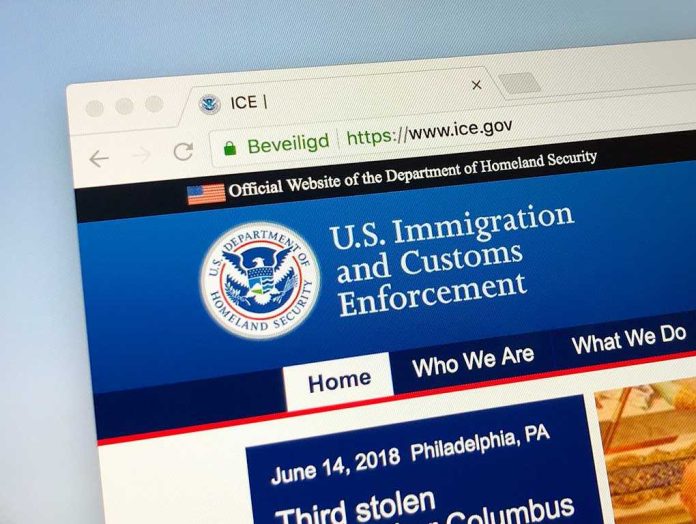
President Trump’s new immigration crackdown is unleashing the largest deportation machine in American history, alarming critics and energizing conservatives who see it as a long-overdue defense of America’s borders and values.
Story Highlights
- Trump administration implements sweeping 2025 immigration reforms to accelerate deportations and tighten border security.
- Executive actions expand expedited removal, militarize the southern border, and empower local law enforcement as immigration agents.
- The new law, “One Big Beautiful Bill Act,” injects $170 billion into enforcement and detention, fueling mass deportations and family separations.
- Civil liberties groups and leftist critics warn of due process violations, but Trump supporters hail the return to law and order.
Trump’s 2025 Immigration Overhaul: Border Security Takes Center Stage
In the opening months of his second term, President Donald J. Trump has wasted no time delivering on his campaign promise to secure America’s southern border and prioritize American sovereignty.
Through a series of sweeping executive orders and legislative actions, the administration has moved aggressively to clamp down on illegal border crossings, expand removals, and push back against what many conservatives see as years of unchecked migration and lax enforcement.
The administration’s approach marks a sharp break from the permissive policies of the previous White House, signaling a new era of immigration enforcement focused on national security and the rule of law.
Central to this strategy is the rapid expansion of expedited removal, a process that allows federal immigration officers to deport noncitizens apprehended anywhere in the country if they cannot prove two years of continuous presence.
Previously reserved for border regions, this authority now extends nationwide, sidestepping lengthy court proceedings and enabling swift removals. The administration has also revived mass workplace and community raids, empowered local law enforcement to act as federal immigration agents, and cut off funding to sanctuary cities that refuse to cooperate with federal authorities.
Critics argue these moves erode due process, but supporters argue that restoring order and enforcing existing laws is essential to preserving American sovereignty.
Massive Funding Boost: Detention, Deportation, and Enforcement Expansion
The July 2025 passage of the “One Big Beautiful Bill Act” (OBBBA) delivered a historic $170 billion windfall to federal immigration enforcement agencies, quadrupling the annual detention budget and supercharging operations to unprecedented levels.
The law pours billions into expanding detention centers, including facilities for families, and funds an army of new agents tasked with carrying out mass deportations. The Department of Homeland Security received $45 billion for detention expansion, while $32 billion is earmarked specifically for enforcement actions.
The result is a system that critics claim incentivizes racial profiling and tears families apart, yet many Trump supporters view as long overdue after years of border chaos and executive inaction.
To further discourage illegal entry, the law imposes steep new fees for asylum seekers and harsh penalties for unauthorized crossings, while also slashing eligibility for humanitarian relief.
Programs such as Temporary Protected Status (TPS) and Deferred Action for Childhood Arrivals (DACA) face elimination or dramatic rollbacks, even as visa categories for legal immigrants are curtailed.
The administration insists these tough measures are necessary to restore the integrity of the immigration system and deter abuse. Detractors, however, warn of humanitarian crises at the border and lasting harm to immigrant communities, while supporters argue that only firm action will end the cycle of illegal crossings and restore the rule of law.
Militarizing the Border: Executive Orders and Local Partnerships
President Trump’s executive orders have not only tightened legal and procedural barriers for migrants but have also mobilized military resources and hardware to the border.
New directives authorize the use of military personnel to deter crossings, and the administration has pressured states and localities to work hand-in-glove with federal agencies.
The expansion of programs like 287(g) enables state and local police to carry out federal immigration duties, further blurring the line between local policing and immigration enforcement.
While left-leaning groups argue this sows fear and undermines civil rights, many conservatives see it as a necessary step to reclaim sovereignty and ensure that every level of government is invested in upholding the law.
Despite legal challenges from civil liberties organizations, the Trump administration remains steadfast in its pursuit of a border security agenda that puts Americans first.
The administration’s defenders argue that these policies are not only constitutional but also a reflection of the will of voters frustrated by years of porous borders, rising crime tied to illegal entry, and burdens on public services.
For many on the right, the administration’s unapologetic stance is a welcome return to the principles of limited government, law and order, and respect for American citizenship.
As the new system takes hold, debate over its scope and impact continues to rage in Congress, the courts, and communities nationwide. Yet for millions who have long demanded a return to common-sense enforcement, the Trump administration’s actions represent not just a policy shift, but a fundamental reaffirmation of America’s commitment to secure borders and the rule of law.
Limited data is available on the long-term effects, but the early months of 2025 have already witnessed historic changes—confirming that, for better or worse, the debate over immigration is far from settled.
Sources:
President Trump has signed the One Big Beautiful Bill into Law




